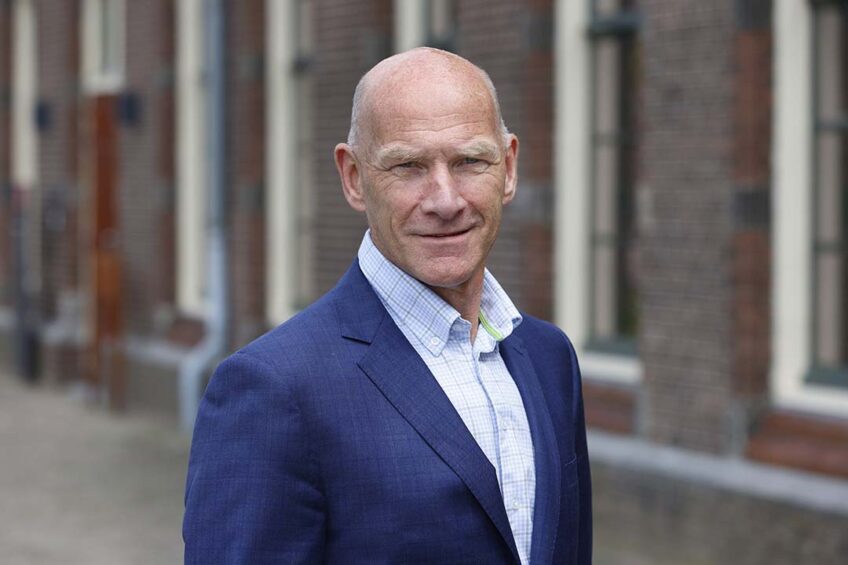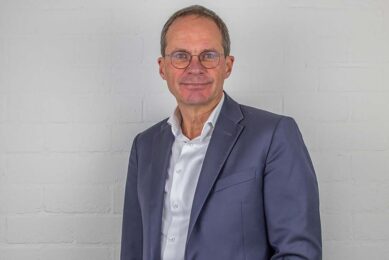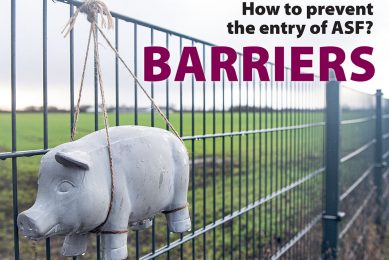Interview Wyno Zwanenburg (CoViVa): Taking on director’s role in pig business

All over the world organisations exist in and around the swine industry. Recently the Netherlands witnessed the emergence of a brand new umbrella platform, called CoViVa. Consisting of most pig-related stakeholders, it is trying to address major topics that impact all. Since 2023, Wyno Zwanenburg has been its chairman. “This is about a common agenda for an entire industry.”
As a pig producer in 1997, Wyno Zwanenburg experienced first-hand what it was like to be in the middle of everything. He and his wife had just taken over the daily management of his family’s pig farm in the Dutch province of North Brabant, when they suddenly found themselves located close to the heart of an outbreak of Classical Swine Fever (CSF).
Zwanenburg recalls, “Agricultural unionist Wien van den Brink called me with a very practical question: to give an idea as to how many pigs there were exactly within a 2 km radius around the farm of origin. As from that moment, I got involved, becoming a member of the national crisis team for animal health control.”
Leading voice
It would be the onset of a career involving being a leading voice, building bridges and consulting agricultural parties. So much even, that when he decided to stop with his farm of 1,150 sows in 2016, he totally started to focus on consultancy services, both nationally and internationally.
“I play the role of lynch pin from time to time. Imagine someone encounters a problem, then I say – well, if you have that problem, best call John. Then the response often is that he or she does not know John. Well, I do. So I can bring people in contact with one another, at the right levels with the right expertise.”
CoViVa is trying to take this director’s role: how can an entire chain find answers?
I suppose that this role of lynch pin is the reason CoViVa asked you to be chairman?
“True, I happen to know most players involved, and they know me. As I am not presiding as a pig producer, I can play the role of independent chairman. Questions pop up like: What exactly do we want? What initiatives are widely supported? What topics are sensitive – both content-wise or because of old grudges? Sometimes I have to act like a relationship therapist, as often things just need to be said aloud in order to move on.”
What can you tell us about CoViVa’s history?
“CoViVa emerged from a first liquidation round in the Dutch pig industry in 2019. To be able to perform this, the ministry of agriculture was involved, the pig producers’ organisation (POV) as well as Rabobank. Soon they realised that getting together worked very effectively. Even though they met to discuss a liquidation round, they grabbed those opportunities to also discuss other topics related to the future of pig production in the Netherlands. That is when they concluded: we should continue this on a separate platform.”
So far retailers are not visible within CoViVa. Is that on purpose?
“Not only retailers, but also regular trade unions are missing. And so are some banks. That is not the result of a conscious decision, I feel. It just has not happened yet. Look at the pig genetics companies; the only one that has joined so far is Topigs Norsvin. Meetings are underway with others, such as e.g. Hendrix Genetics, DanBred and PIC, to see if we could organise things with all genetics companies.”
“And one could say: shouldn’t there be 1 or 2 non-governmental organisations (NGOs) as part of it, to create more support for their own projects? At the moment, NGOs are only present within various CoViVa projects. In the future they may also join, but right now this is not the case.”
Is CoViVa an answer to present-day issues in society?
“Yes, we do have a director’s role in that sense, to address those themes that exist in society or politics. Look at our project aimed at keeping pig long tails long (in order to stop tail docking, VtB). CoViVa is trying to take this director’s role: how can an entire chain find answers? That means not only answers from a producer’s perspective, not only from a feed industry perspective, and not only from a meat industry perspective.
“There are a few pretty dynamic topics, for instance when talking about carbon footprint and climate change. Predominantly the Dutch feed sector feels pressure to take responsibility with sourcing and apply key performance indexes (KPIs), etc. Even though pressure on the feed sector will trickle through on meat prices, meat packers also suffer from pressure by retailers to work on CO2 reduction. All players have now reached the conclusion that they should not try to compete with one another. Instead, they should develop a joint standard. Otherwise it is will be hard to stay in business.
“A similar thing occurred with animal welfare; producers as well as retail have put pressure on how to valorise the additional welfare. Again, there was consensus: we have a common need to align, to take care that we all approach both market as well as consumers and media in a uniform manner.
“The perception was that only negative stories were flying around like: “We need to reduce meat consumption, pig production levels do not have to be this high, the pig industry should leave the country, etc.” CoViVa is presenting a different story: We are working on it, here is what we are doing well.”
It matters to involve NGOs, to be able to tell the right story
In total, CoViVa has identified 5 key ambitions. One of them is “taking a central position in the circular economy.” Why is cooperation on this ambition so important?
“That is a very topical subject, as I just mentioned the feed industry and its raw material sourcing. The feed industry is busy choosing the right KPIs – and making sure that there is international acknowledgement about definitions. Otherwise the pig production chain may be confronted by NGOs or politicians, saying that we might have been using incorrect basic assumptions. That is why it matters to involve NGOs, to be able to tell the right story. Otherwise we can tell stories in the media about being global market leader when it comes down to re-using by-products, but if the next thing is some campaign by an NGO, then things could turn out to be counterproductive.”
How far is the Netherlands compared to its neighbours when it comes down to re-using by-products?
“I do not know of any other area in the world that makes so much use of by-products in pig production. I would choose to speak of “upcycling” rather than “recycling,” as we make a high quality animal protein type from a lower-quality protein source. In the Netherlands, obviously, our infrastructure matters, everything is relatively compact and is located close to one another. Technically the country is well equipped, and knowledge is widely available.”
“I am speaking of area, not of countries, as this type of unique system with an intensive re-use of by-products can only emerge close to big cities with a lot of food processing and consumer products. That leads to fresh ingredients, meaning that one’s got to be close to that infrastructure.”
“In fact, this is similar to what used to happen in the Middle Ages. At that time, pigs used to be kept just outside the cities, as the pigs fed on the city’s leftovers. Nowadays the supplies of by-products are just much bigger, plus the entire process has become much more professionalised.”
Another CoViVa key ambition is “robust and healthy pigs.” I noticed that one of the projects of this ambition revolves around making the Netherlands free of Porcine Reproductive and Respiratory Syndrome (PRRS) , like Hungary. Isn’t that very ambitious for an open economy like the Netherlands?
“We managed with other diseases as well, such as for instance Aujeszky’s Disease (a.k.a. pseudorabies, eradicated in 2009, VtB). So why not with PRRS? Key is to bring together all elements that could play a role. After all, PRRS is a more complex disease than Aujeszky’s Disease, think of predominantly its (airborne) transmission pattern, with many farms being located all over the place. That is quite a challenge. This kind of project should however demonstrate what is there to gain, and if people become aware of the advantages, then we should have the ambition to strive for this goal.”
Will neighbouring countries like Germany and Belgium be involved in that project too?
“There are hardly any pigs coming into the Netherlands from Belgium or Germany. They are mostly trucked out. When looking at airborne transmission – that topic will get important at a certain moment.”
“The core question now is: is there a will to cooperate, to see how far it’s possible to get, and what steps are yet to be taken. And if things prove harder than anticipated, then what?”
Is it a competitive disadvantage that the Netherlands is a fragmented industry, unlike Spain or the USA, which is characterised by large integrations?
“When I get to other places on the planet, then I see those integrations too. They do miss one thing though. Within CoViVa the agricultural ministry joined – in other words policy makers are also involved. Themes CoViVa is discussing have a wider societal significance, related to family-run farms, employment opportunities, and generally cover a wider agenda than just an integration having ideas.”
Would a platform model like CoViVa work in other pig countries?
“My experience is that it is a big advantage to be able to bring a coherent story on behalf of the entire chain towards (local) authorities as well as society. That just works better than saying: I’m speaking on behalf of a slaughterhouse or any other company or stakeholder, as that would represent only a part of the industry.”
“The good thing about CoViVa has been the identification of those five core ambitions. On those five themes we really would like to cooperate as those are important topics for us, as well as society. And I could imagine that a similar discussion or line of thought can exist in any other country.”
We can mean so much by just sharing simple Dutch knowledge, to help people work in a more environmentally friendly way, to help increase animal welfare, to raise levels of food safety or develop business models
In the Netherlands, population density is high, with over 17 million inhabitants with an enormous shortage of houses. There is a crisis about nitrogen emissions and politicians have been openly pushing for halving the livestock industry. How optimistic are you about the future of the Netherlands’ pig industry?
“The Dutch livestock industry is still a global market leader. Think of for instance our premix producers – many major players have a Dutch origin. That is because those innovations were developed and applied here. And because those worked out successfully here, it was possible to make them a success elsewhere, too.
“From time to time the Netherlands’ authorities ask me to visit developing countries. We can mean so much by just sharing simple Dutch knowledge, to help people work in a more environmentally friendly way, to help increase animal welfare, to raise levels of food safety or develop business models. With knowledge transfer we can have a major impact in certain areas of the world. I see that role, because in the Netherlands we have that unique cooperation between companies, the authorities and knowledge centres – I’m not only thinking of CoViVa here. Using that, we can say: under our circumstances, and under our conditions, this solution worked for us. Sometimes these solutions need adjusting, and sometimes they can be super-useful.”
“I think the Netherlands can still hold on to that role. Of course we need to we keep enough critical mass going to continue to work on innovative solutions.”









